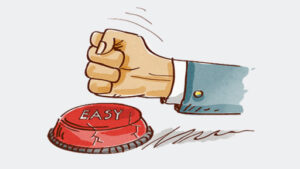
Judge Your Decisions, By Your Decisions.
At the risk of this post sounding like a book review, I

Share this post
Some would argue that trading is the single hardest profession in the world.
Hyperbole? I don’t happen to think so. Hear me out.
In most professions, you are offered a paycheck or have some reasonable assurance that “Once I complete X I will receive Y” (think commissioned sales, performance-based pay, etc.). You can plan around this, and it is close to unthinkable in most cases that you could put in a whole bunch of work and wind up with less money than you started with (expenses aside). OK the real estate agent might invest a bunch in marketing only to have a property listing pulled from them, but this would be the exception and not an expected outcome.
In trading, losses are a fact of life. They are never an “if”, they are always a “when”. They are unavoidable. Just as you can’t win every single hand of poker or blackjack every time, you can’t win every single trade every time. Sure anyone can get on a “hot streak” and have only winners for a decent run. But what they neglect to consider is that the inverse is also true, that they can (and will) end up on a “cold streak” where they can do nothing but lose for a while.
Even some of the most strenuous, stressful jobs in the world don’t compare in my opinion. Let’s take Formula 1 Racing Driver as an example. I’m sure most people can agree that driving a F1 car is insanely, outrageously challenging and difficult. Check this out:
Yeah, that’s crazy tough. I don’t know that I could do it. But here’s the thing. Let’s say the F1 driver performs poorly and doesn’t finish high on the leaderboard. They still get paid! At least until their team drops them, if they continue to underperform. It costs hundreds of millions of dollars to run an F1 team, and the driver doesn’t have to concern themselves with any of that. They “just drive.” Even if worst case (heaven forbid), they crash and die. They don’t have to live with the consequence of that (yes, morbid I know, but the point stands).
Contrast that with you, the independent trader. You have to bear all the expenses of your trading business. They come out of your pocket, regardless of your performance. Every losing trade you make, is a direct hit on your capital. And the worst case scenario where you “die” and blow up your account? Well you get to live with that. You get to dwell on that. You get to “go home” to your husband, wife, significant other, cat, dog, or goldfish and explain to them that you lost it all. And if that thought doesn’t start to make your stomach churn a little… check your pulse!
You also probably get no respect when (and even if) you tell people what you do. “I’m a futures trader” at your average dinner get-together probably conjures up either expectations of you rolling up in the cliche lambo and flashing fat stacks, or images of the degenerate gambler in deep to loan sharks and needing “the big score” to save them. It’s even extremely common for traders to have a partner or spouse who is unsupportive and even downright negative on the whole idea, especially in the formative stages where the money isn’t exactly rolling in. I don’t fault any trader for inventing alternative stories of what they “do” when asked!
Most traders I’ve observed are also highly emotional individuals, in an industry where success requires tremendous emotional control and resilience. A winning trade has them leaping out of their chair and fist-pumping their way to imagined glory. A losing trade has them wanting to curl up into a ball in the corner and suck their thumb. It’s all highs and lows, with very little moderation.
Nearly everyone grossly underestimates (or even dismisses entirely!) the psychological and emotional toll that trading takes, and the enormous amount of internal mental strength and discipline required just to survive, let alone thrive. Trading attracts the lazy, the greedy, the egotistical. The new retail trader has visions of those lambos and stacks of hundos that they can post to Insta. But the reality is a far, far cry from any of that. Most will flame out in no time. Some will come back for a second or third helping of abuse. Few will learn from those mistakes and recognize that the workload they should be putting in is probably 20% trading, 80% trader.
So what are you working on right now? Are you focusing on your platform? Your indicators? Your signals or setups? Or are you focusing on your discipline? You psychological control? Your emotional responses to the outcome of your trading? I can say for myself that after a couple decades of chasing the elusive trading dream I kept being sold, I finally saw real, genuine, measurable progress when I started to work mostly on me.
Trading is easy. Being a trader is hard!
Until next time, trade well!
Jonathan van Clute
Community Manager, Trading Research Group
Share this post
You Might Also Be Interested In:

At the risk of this post sounding like a book review, I

As I write this, it’s mere hours away from the clock striking

Well seeing as how it’s “the day after Black Friday” in the

There is a risk of loss in futures, forex and options trading. There is risk of loss trading futures, forex and options online. Please trade with capital you can afford to lose. Past performance is not necessarily indicative of future results. Nothing in this site is intended to be a recommendation to buy or sell any futures or options market. All information has been obtained from sources, which are believed to be reliable, but accuracy and thoroughness cannot be guaranteed. Readers are solely responsible for how they use the information and for their results. Trading Research Group does not guarantee the accuracy or completeness of the information or any analysis based thereon.
Hypothetical performance results have many inherent limitations, some of which are described below. No representation is being made that any account will or is likely to achieve profits or losses similar to those shown; in fact, there are frequently sharp differences between hypothetical performance results and the actual results subsequently achieved by any particular trading program. One of the limitations of hypothetical performance results is that they are generally prepared with the benefit of hindsight. In addition, hypothetical trading does not involve financial risk, and no hypothetical trading record can completely account for the impact of financial risk of actual trading. for example, the ability to withstand losses or to adhere to a particular trading program in spite of trading losses are material points which can also adversely affect actual trading results. There are numerous other factors related to the markets in general or to the implementation of any specific trading program which cannot be fully accounted for in the preparation of hypothetical performance results and all which can adversely affect trading results.
This presentation is for educational purposes only and the opinions expressed are those of the presenter only. All trades presented should be considered hypothetical and should not be expected to be replicated in a live trading account.
Testimonials and reviews appearing on this website may not be representative of other clients or customers and is not a guarantee of future performance or success.
© 2022 Make Ticks LLC dba Trading Research Group. All rights reserved. TickMaker™ is a trademark of Make Ticks LLC.
2 thoughts on “Trading is easy. Being a trader is hard!”
Trading is 25% mechanical and 110% Mental… ANYONE can “trade”….
Some trading platforms are free and for a few hundred dollars and a brokerage account you can be “in the game”… But it’s much more like Mad Max and Thunderdome… Many will enter but few will survive…. Explore your relationship with money and understand how that works FIRST before risking any capital…
LOL OMG that is so true… now I’m gonna picture Thunderdome every time I sit down in the morning. =D